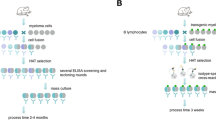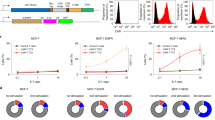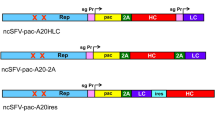Abstract
HYBRIDISATION of a myeloma cell line with hyperimmunised spleen cells can provide hybrid cell lines secreting monoclonal antibodies of predefined specificity1,2. Lines have thus been established which secrete homogeneous antibodies against antigens such as sheep red blood cells1, the hapten 2,4,6-trinitrophenyl2, influenza virus3, horse red blood cells, the haptens (4-hydroxy-3-nitrophenyl)acetyl and (4-hydroxy-5-iodo-3-nitrophenyl)acetyl, group A streptococcal carbohydrate, hen egg lysozyme, chicken γ globulin, the synthetic polypeptide poly-L-(Tyr, Glu)-poly-D,L-Ala-poly-L-Lys4 and antigens encoded by the major histocompatibility complex (MHC) of the rat5. We report here the derivation of three cloned hybrid cell lines which synthesise antibodies detecting different public antigenic specificities of the mouse H–2 complex. These hybrid cell lines can be grown in the mouse as ascites tumours, and the ascites fluids obtained contain large quantities of homogeneous anti-H–2 antibodies.
This is a preview of subscription content, access via your institution
Access options
Subscribe to this journal
Receive 51 print issues and online access
$199.00 per year
only $3.90 per issue
Buy this article
- Purchase on Springer Link
- Instant access to full article PDF
Prices may be subject to local taxes which are calculated during checkout
Similar content being viewed by others
References
Köhler, G. & Milstein, C. Nature 256, 495–497 (1975).
Köhler, G. & Milstein, C. Eur. J. Immun. 6, 511–519 (1976).
Koprowski, H., Gerhard, W. & Croce, C. M. Proc. natn. Acad. Sci. U.S.A. 74, 2985–2988 (1977).
Hämmerling, G. J. et al. XXV Colloquium Protides of the Biol. Fluids (ed. Peeters. H.) 551–558 (Pergamon, Oxford, 1978).
Galfre, G., Howe, S. C., Milstein, C., Butcher, G. W. & Howard, J. C. Nature 266, 550–552 (1977).
Klein, J. Biology of the Mouse Histocompatibility-2 Complex (Springer, Berlin, 1975).
Dorval, G., Welsh, K. J. & Wigzell, H. Scand.J. Immun. 3, 405–411 (1974).
Sjöquist, J., Forsgren, A., Gustafson, G. T. & Stålenheim, G. Cold Spring Harb. Symp. quant. Biol. 32, 577–581 (1967).
Hämmerling, G. J. Transplant. Rev. 30, 64–82 (1976).
Klein, J. Nature 229, 635–637 (1971).
Snell, G. D., Cherry, M., Démant, P. Transplant. Rev. 15, 3–25 (1973).
Cotton, R. G. H. & Milstein, C. Nature 244, 42–43 (1973).
Talmage, D. W. Science 129, 1643–1648 (1959).
Hämmerling, G. J. Eur.J. Immun. 10, 743–746 (1977).
Pontecorvo, G., Riddle, P. N. & Hales, A. Nature 265, 257–258 (1977).
Author information
Authors and Affiliations
Rights and permissions
About this article
Cite this article
LEMKE, H., HÄMMERLING, G., HÖHMANN, C. et al. Hybrid cell lines secreting monoclonal antibody specific for major histocompatibility antigens of the mouse. Nature 271, 249–251 (1978). https://doi.org/10.1038/271249a0
Received:
Accepted:
Published:
Issue Date:
DOI: https://doi.org/10.1038/271249a0
This article is cited by
-
Monoclonal antibodies recognize interaction determinants of MHC plus foreign beta-2 microglobulin
Immunogenetics (1988)
-
Characterization of newly isolated monoclonal antibodies against MHC of a Japanese wild mouse
Immunogenetics (1986)
-
Abrogation of metastatic properties of tumour cells by de novo expression of H–2K antigens following H–2 gene transfection
Nature (1985)
-
Control of synthesis and expression of H-2 heavy chain and beta-2 microglobulin in AKR leukemias
Immunogenetics (1985)
-
Expression of marine H–2Kb histocompatibility antigen in cells transformed with cloned H–2 genes
Nature (1982)
Comments
By submitting a comment you agree to abide by our Terms and Community Guidelines. If you find something abusive or that does not comply with our terms or guidelines please flag it as inappropriate.



